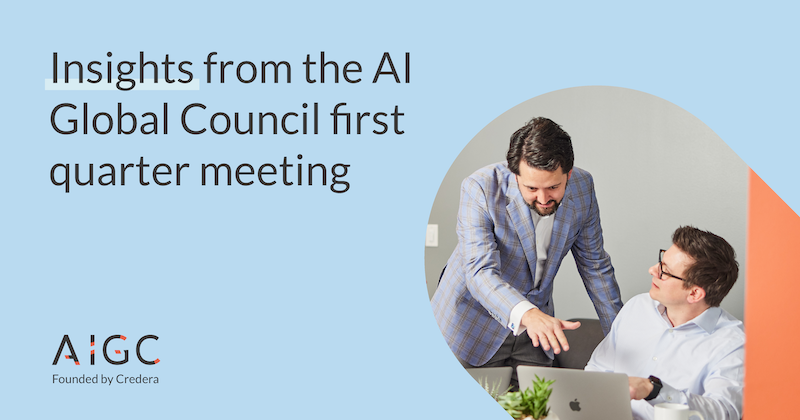AI at the forefront: Insights from the AI Global Council first quarter meeting
 Natalie Jacks
Natalie Jacks

The buzz around artificial intelligence (AI) shows no signs of slowing down, and for good reason. This transformative technology continues to reshape industries, redefine workflows, and unlock new possibilities across the globe. To stay ahead of the curve, leading organisations are actively integrating AI into their strategies, but navigating this complex landscape requires expert guidance and informed discussions.
That's where the AI Global Council comes in. The AI Global Council is a group founded to foster collaboration and help shape the responsible development and deployment of AI. It includes council members from educational institutions and organisations such as Mastercard, AWS, McDonalds, United States Patent and Trademark Office, GoGuardian, Pluralytics, and Credera.
The council recently convened for its first quarter 2024 meeting, delving into critical topics surrounding AI adoption, AI maturity models, and strategic implementation. This blog post aims to synthesise the key lessons from this insightful gathering and offer valuable takeaways for organisations navigating their own AI journey.
Day one: Charting the course with an AI maturity model
In the council’s first session, members stressed the importance of being able to assess an organisation’s maturity, or readiness, surrounding AI.
Following a review of potential models, the council convened to discuss feedback. The first day of the council meeting focused on their subsequent thoughts and laying the groundwork for effective AI integration. Here are some of the key points that emerged:
- Keeping AI assessment approachable: While in favour of the overall structure of a quantitative maturity assessment, the council emphasised the need to keep it simple and accessible. Feedback included creating tiered versions for different organisational functions and levels and ensuring clear, universally understood language. Additionally, the council deemed it crucial to incorporate elements like governance, skill assessment, and ethical considerations.
- Finding the right problems to solve: Identifying the right problems for AI solutions is necessary to find success with AI. The council advocated for leveraging unique data assets, prioritising value chain exploration, and avoiding the "solution to everything" trap. They emphasised starting with clear goals and assessing whether AI is truly the optimal approach, ensuring targeted application and avoiding aimless experimentation.
Day two: Looking ahead and expanding horizons
Day two focused on future-oriented discussions and actionable advice for organisations at various stages of their AI journey. The conversation was spurred by a hypothetical scenario: “If a CEO friend called you up and said ‘I want to get my company into AI’ how would you approach the conversation?”
Key takeaways from the second day’s discussion included the following answers to that prompt:
- Advising others on AI adoption: Before providing guidance on how to enter the AI space, the council stressed the importance of understanding the organisation's motivations, maturity level, and potential risks. They stressed the need to first understand goals, existing capabilities, data availability, and leadership commitment in order to tailor recommendations and avoid one-size-fits-all approaches.
- Ask first: In order to tease out necessary background information for tailoring their guidance, the council settled on three guiding questions they would employ to gain insight:
- What is the end goal and what is your strategy to meet it?
- What is the starting point and have you done this sort of thing before?
- What known challenges are you facing?
- Leadership and organisational structure: Later in the day the debate surrounding a chief AI officer (CAIO) position captured significant attention. While acknowledging the potential benefits of centralised leadership and rapid strategy execution, the council also raised concerns about potential role conflicts and organisational siloing. Instead, they recommended leveraging existing structures, forming collaborative teams or councils, and ensuring the designated AI leader has access to necessary data and resources.
Beyond the meeting room: Putting insights into action
Looking ahead to the next quarter, the council identified education as a crucial area of exploration. This includes examining how AI can be incorporated into curricula, what parents and teachers should consider, and the evolving skillsets needed for future leaders. Additionally, staying abreast of cutting-edge advancements and measuring progress in the AI landscape were highlighted as valuable discussion points.
In summary
The AI Global Council first quarter meeting provided a wealth of valuable insights and actionable guidance for navigating the ever-evolving world of AI. By embracing continuous learning, fostering open dialogue, and adapting strategies to individual contexts, organisations can leverage AI's potential to unlock greater efficiency, innovation, and competitive advantage. We look forward to sharing more of these insights and guidance in the coming weeks.
Explore more about the AI Global Council
The AI Global Council is focused on taking amorphous and challenging topics and sharing a balanced and holistic perspective that can move everyone forward. For more information about the Council, and to stay connected to their work, follow along on LinkedIn or get in touch with a member of our team.
Read more:
Credera launches global cross-functional AI council and increases AI investment to lead through paradigm shift
From the AI Global Council: Nine AI questions leaders should be asking to avoid pitfalls
Introducing the AI Global Council: JoAnn Stonier
Introducing the AI Global Council: Tia White


Have a question?